Vital's COVID-19 Response Team is in full force in 61 countries.
More than 100 people focused on COVID-19 under the leadership of the Prevent Epidemics team, with many more team members addressing COVID-19 through our core programs.
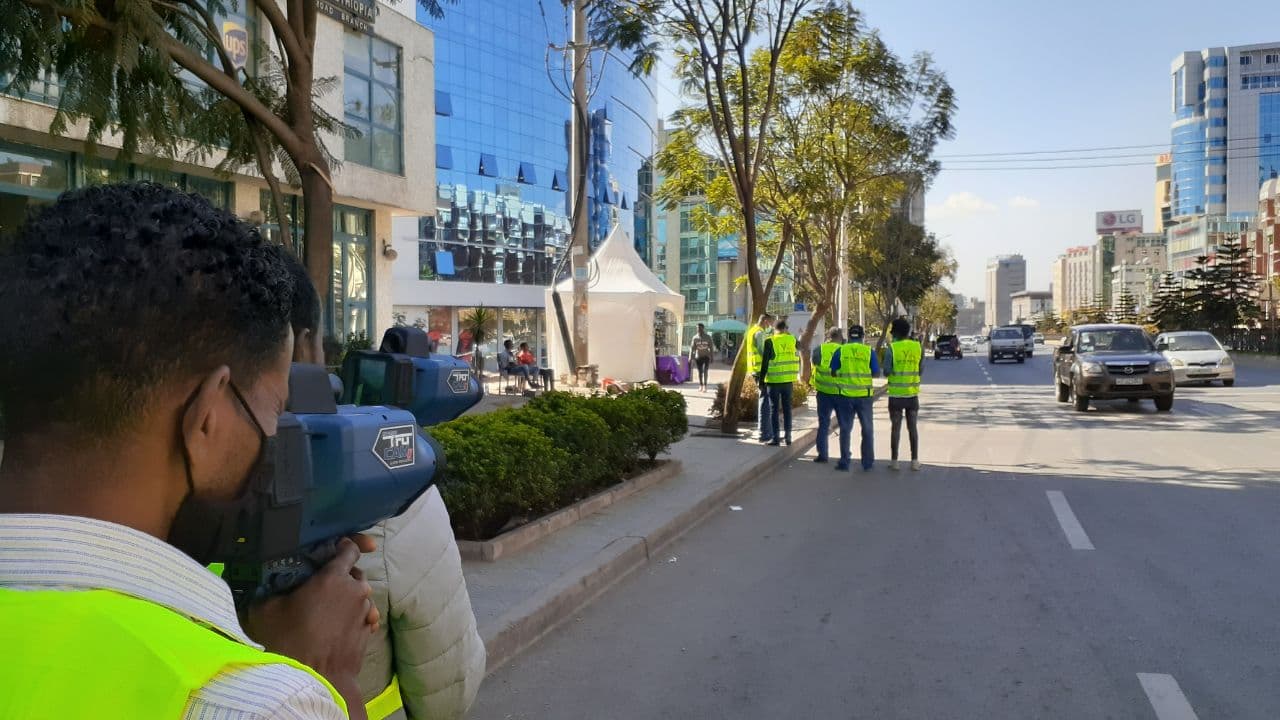
Radar training to enforce speeding laws in Addis Ababa, Ethiopia.
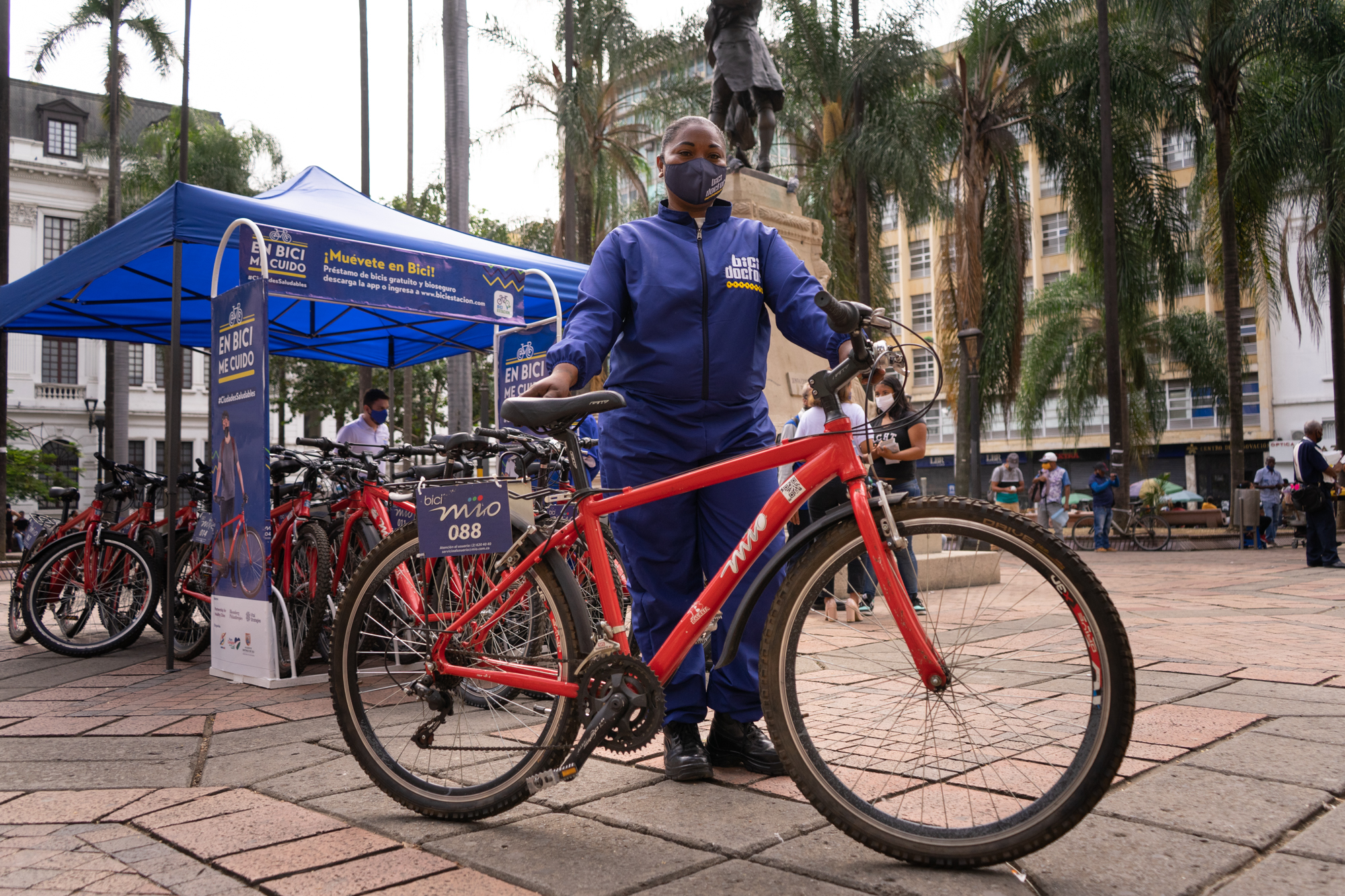
Martha Isabel Esquivel is one of four “Bike Doctors” in Cali, Colombia, repairing bicycles for free as part of a citywide effort to encourage cycling during the pandemic and beyond.
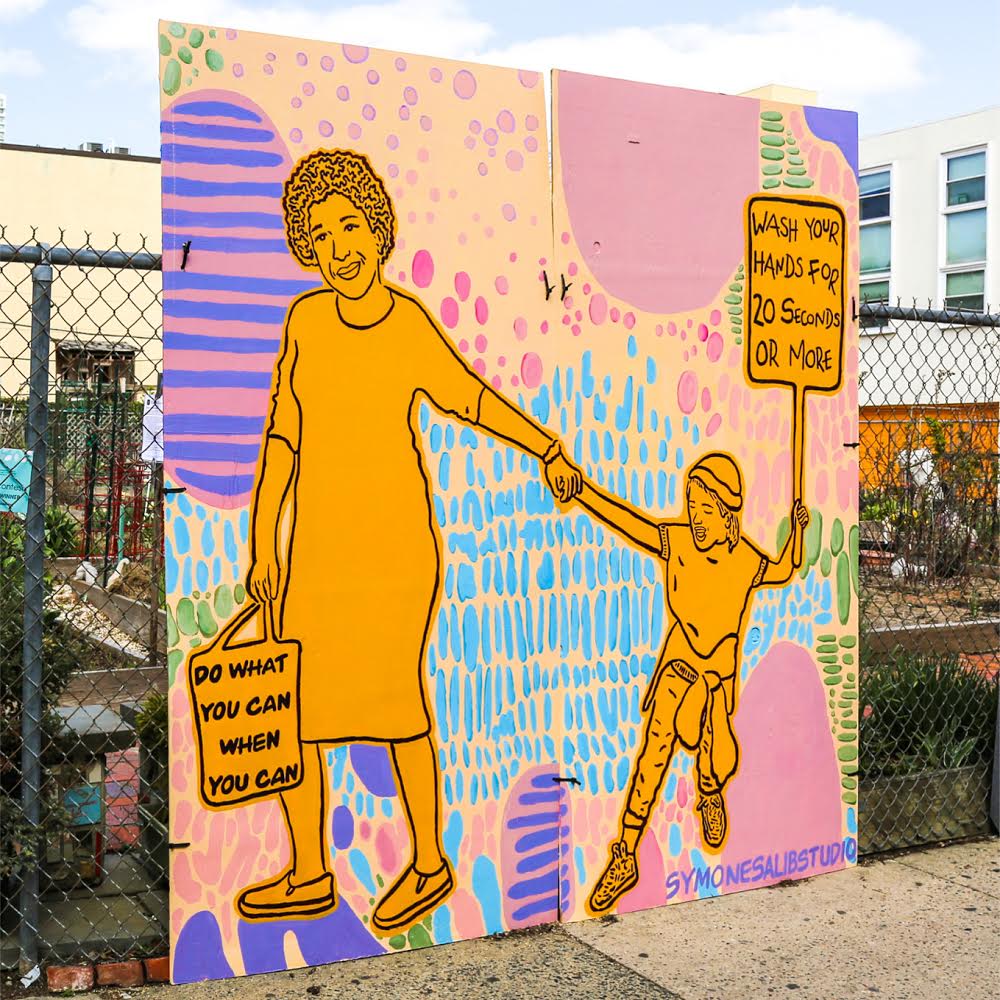
Symone Salib’s mural depicting members of her community, part of a public art project in Philadelphia, underscores the role of the individual in advancing public health action.
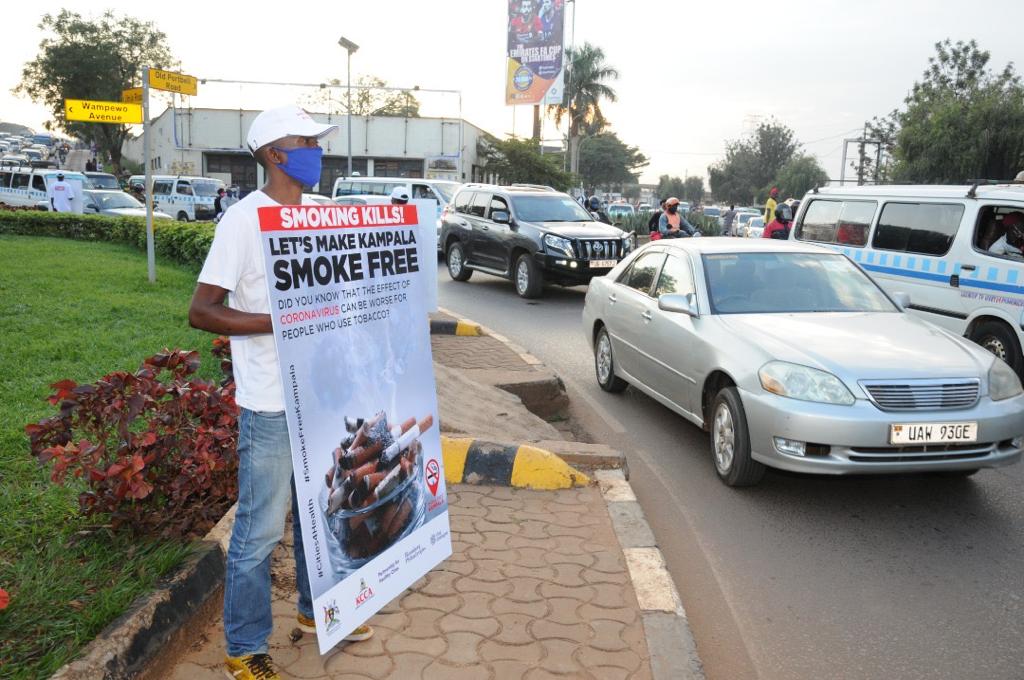
Kampala, Uganda, launched a roadside poster campaign to support a drive to enforce a national smoke-free law.

Ministry of Health personnel rapidly screening toys for lead in Lima, Peru, using a handheld XRF lead detector provided by our Childhood Lead Poisoning Prevention program.
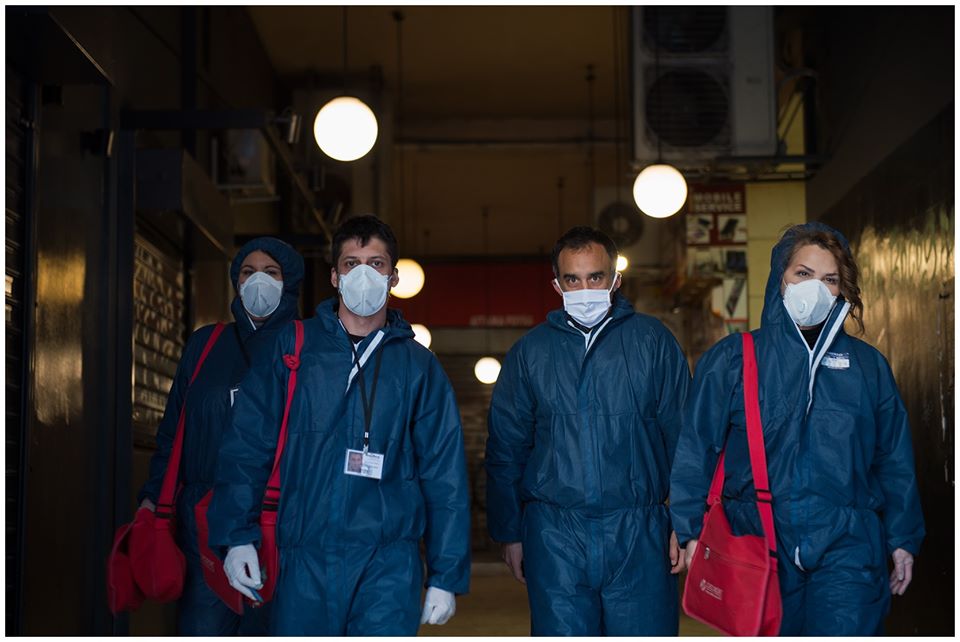
A team from the Streetwork Project, which supports socially excluded communities in Athens during the pandemic.
In 2020, our lives, communities and economies were upset in ways beyond what we could have imagined. Public health, normally an invisible web of protections, was thrust onto center stage daily.
At the start of the year, even before the virus had a name, Vital Strategies saw the pandemic that lay ahead. We knew we could not sit on the sidelines and had to harness our expertise and our global relationships with governments and partners around the world to help. We immediately positioned ourselves as “honest brokers” of the evolving science and risks, and we played a significant role in communicating about the pandemic via the media and our website and informing our partners as well. We also provided rapid response funds to 21 countries in those early days, and over the course of the year provided resources and technical assistance to 53 countries in Africa, Asia and the Americas.
At the same time, we knew that the pandemic made our other areas of work in noncommunicable diseases, overdose and injuries even more important. With the crisis dominating the news and overwhelming health systems, preventive measures for NCDs—such as cancer, heart disease, lung disease and diabetes—were being ignored, exacerbating the effects of the pandemic itself.
We forged ahead, making the case for why, even during the emergency response, we could not lose focus or lose ground on critical health issues such as tobacco control, air quality and food policies—all central drivers of noncommunicable diseases. We stressed the necessity of reducing the inequities created by poverty and racism, and their connection to these diseases and to overdose, all contributing to excess illness and death.
For this year’s annual report, we have created a timeline of 2020’s dramatic events together with a timeline of Vital Strategies’ actions and accomplishments. It is an opportunity to see behind the headlines to see the role of public health during the most severe pandemic the world had faced in more than a century.
The Partnership provides support for disease surveillance, risk communication, media campaign development, legal guidance and implementation of public health and social measures to curb disease spread. Since its April 2020 launch, more than 150,000 users have visited the Partnership for Healthy Cities COVID-19 Response Center which hosts nearly 400 publications, tools and other technical resources for cities around the world. As part of the response, the Partnership hosted 11 webinars for mayors and city officials, and supported 42 cities in adapting their noncommunicable disease and injury prevention plans and protocols to the COVID-19 context.
The Partnership's webinars facilitated the exchange of strategies and lessons learned during the pandemic. Read more on our blog.More than 100 people focused on COVID-19 under the leadership of the Prevent Epidemics team, with many more team members addressing COVID-19 through our core programs.
In the subsequent months, the coalition distributed thousands of naloxone kits and fentanyl test strips primarily through phone line orders and mail delivery; helped to organize a coalition of more than 20 community organizations working together to advocate for greater access to harm reduction programs; and conducted harm reduction trainings for individuals, law enforcement organizations and health care institutions.
Resolve to Save Lives’ cardiovascular health team contributed to the development of the “WHO Technical Specifications for Automated Non-Invasive Blood Pressure Measuring Devices With Cuff”.
“Governor Wolf’s decision to release vulnerable people is a reasoned and humane step toward saving lives. We hope and expect that Pennsylvania will continue to implement critical decarceration measures to avert a devastating and preventable prison pandemic.”
Road traffic injuries are the leading cause of death for children and adults between the ages of 5 and 29 globally. In Kampala, Uganda, this Road Safety-supported project brought together community members and government officials to paint a new crosswalk near a school.
To help governments enhance their outbreak surveillance and response planning, Vital Strategies develops “Revealing the Toll of COVID-19: A Technical Package for Rapid Mortality Surveillance” and the Excess Mortality Calculator. These tools were developed with partner organizations, including WHO. The technical package guides efforts to generate daily or weekly counts of total mortality by age, sex, date of death, place of death and place of usual residence, providing a fuller picture of the scale and direction of the excess mortality experienced during the pandemic. Vital Strategies’ supported outputs are used as a reference in major media outlets, including The New York Times and The Economist.
Explore our resources for data-driven health policymaking.Vital’s commentary in the Tropical Medicine and Infectious Disease journal detailed how the COVID-19 pandemic is affecting implementation of STREAM and other TB clinical trials, and how the STREAM trial’s timely and effective response ensured that no trial participant experienced treatment interruption, despite significant supply chain disruptions. The experience of the STREAM trial against the backdrop of the pandemic highlights the importance of contingency planning and risk mitigation both before and during unanticipated crises.
The Resolve to Save Lives team produced one-page fact sheets for both patients and primary health care providers on how to reduce risk of COVID-19 transmission, which were translated into more than 15 languages and disseminated by partners around the world. The team also created “Safe Route to Care: Primary health care redesign to protect chronic disease patients” and “Leveraging Technology to Improve Health Care During the COVID-19 Pandemic and Beyond,” key resources in the Resolve to Save Lives Playbook for adaptive response to COVID-19.
To counter the flurry of media reports citing flawed studies that suggested nicotine can prevent COVID-19, STOP issued a statement and a critique of the studies. Other 2020 reports revealed the industry’s efforts to lure younger customers, mislead policymakers and the public and interfere in policy, and called for the sport of Formula 1 to stop accepting tobacco sponsorship. STOP and its research was mentioned in 251 media stories spanning more than 30 countries, and its website received more than 350,000 page views, with a major increase from low- and middle-income countries including Mexico, the Philippines, Brazil and India.
CNN reported that than 2 million people in the U.S. struggle with opioid use disorder and quoted Vital’s Daliah Heller on how COVID-19 can trigger drug use along with a “great potential for overdose.”
Chennai STREAM Community Advisory Board Coordinator Sister Mary Josephinal Francis (right) at the Street Theater event in Northern Chennai.
“It is our responsibility to mitigate the impact of racism and other forms of social injustice so tightly woven in the web of systems that shape lives and livelihoods. We take this moment to commit to confronting injustice in how we work, in what we work on, and to hold ourselves accountable for making progress whenever and wherever we can. In the weeks since the killing of George Floyd, people around the world have been shaken into a new understanding of the extent and impact of deeply entrenched institutional racism in the United States. Black Americans continue to pay the price of structural racism with their health, as evidenced by shorter life spans, poorer outcomes in medical treatment, staggeringly high maternal mortality rates, and more. To confront this challenge, Vital Strategies begins within, by launching a diversity, equity and inclusion task force in July to chart our path going forward.”
Vital Strategies is committed to promoting health equity. Read more from our President and CEO José Luis Castro.The digital platform offers governments and nongovernmental organizations access to hundreds of media resources in more than 25 languages, including original material vetted by experts, curated materials from leading organizations around the globe, and unique technical guidance that can be used to create campaigns that empower and protect people throughout the COVID-19 response. The platform provides examples of clear and strong messages—and adaptations into radio scripts, illustrations and YouTube videos—that can be adapted by governments and organizations to fight the spread of the coronavirus.
Vital Strategies conducted 12 focus groups with 88 participants in New York City and Philadelphia who identified as part of the African American, English- and Spanish-speaking Latinx, and Black immigrant communities. The results were used in the development of the “Be the One” campaign and Contact Tracing Community Messaging Toolkit, both designed to support ongoing activities by health departments, community organizations and trusted messengers to promote the value of contact tracing as part of the effort to slow the spread of COVID-19.
The Healthy Food Policy Fellowship was launched in 2020 to combat an important barrier to addressing global obesity—the dearth of research expertise to guide national food policies. Funded by Bloomberg Philanthropies, the fellowship provides complete funding to Ph.D. or LL.M. candidates who aim to foster healthier food environments through the use of effective policies, and who reside in one of the program’s six focus countries: Barbados, Brazil, Colombia, Jamaica, Mexico and South Africa.
The first session of Leading Through Crisis: Reducing the Impact of COVID-19 in Latin America and Africa, a six-part, virtual learning series, was launched for city leaders in 18 countries across the two continents. The collaboration between the Bloomberg Harvard City Leadership Initiative and the Partnership for Healthy Cities provided mayors with science-based guidance, crisis leadership tools and resources to combat the devastating health, social and economic impacts of the pandemic. Topics include managing the public health emergency, navigating fiscal challenges imposed by the pandemic and preparing for recovery in the current global economy.
Resolve to Save Lives supported the federal Ministry of Health and WHO to develop and launch the program, which began enrolling patients in 62 health centers and ten primary hospitals across seven regions of the country.
Vital Strategies President and CEO José Luis Castro.
Staff and consultants working in 73 countries
400+
People who have received hypertension care through Resolve to Save Lives initiatives
1.3 M
Countries supported to generate excess mortality data to measure COVID-19 impact
14